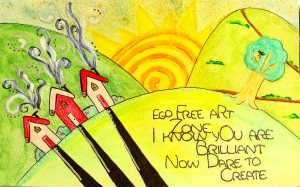 Are you feeling alive to new creativity? Enthused with the new year of new beginnings, opportunities? Are you gracing yourself with time and opportunity to dabble, create, have fun, try new things? We are a few weeks into renewed enthusiasm; how is it working for you?
Are you feeling alive to new creativity? Enthused with the new year of new beginnings, opportunities? Are you gracing yourself with time and opportunity to dabble, create, have fun, try new things? We are a few weeks into renewed enthusiasm; how is it working for you?
I am hearing from some that they are experiencing a block, their interest is there, their desire is there, and when they sit down to write, draw, create – everything goes blank. Someone else recently shared that she has this dangling desire but she doesn’t know what to do – she doesn’t know where to begin. One other person said, (like I deal with so often, as well) that she battles the perfection issue and therefore does nothing.
Oh, blessed ego. I have no intentions to exposit on ego, to dis it, or to tell you to thwart it, or rid of it. In fact, I think the opposite is true. Let me explain.
We know the ego is not the innovator in our lives. It governs the safe aspects of us. It needs validation, approval, rightness. Our ego dares not to be ok, just ok, it wants brilliancy. So many veins of thought lead us into the practice of getting rid of ego’s power for the good of the commonality of humanity, for the practice of oneness, for the betterment of our souls. Do you ever find though, that when you move in to “work” on things, or attempt to override the ego, there is more failure sometimes, and a greater ego-battle?
Instead of trying to lessen or get rid of the ego’s influence or domination, maybe we should embrace it. Move into it, acknowledge its purpose, appreciate how it has helped, protected, kept us safe throughout the years. In fact, perhaps we should take a different approach with our own self care in acknowledging the ego as brilliant. Hmmm. Brilliant. Yes, brilliant to help with resiliency, management of experiences, (t)raumas in our lives, (T)raumas (if there were those), and relationships. Our egos protect us from hurtful words, interactions, and patterns. Our esteem is our management of our self in this world protected by our ego. Our view of our self-worth or value is not just based on external influences, it is based on our egos protection of our self in relationship. Protectively we position ourselves better than in some situations, worse than, in others, over powering at times, victim-like at times, but we don’t do that because it is fun, or we have time on our hands. Our ego brilliantly protects us in relationship to the world.
Homeostasis. Balance. Acceptance. Validation. Normalization. No matter what we are experiencing in our lives, these words are the intentions, as is true with creativity, our ego, and its role in protecting us. So when we look at being free and balanced in our energies, and when we desire to allow our creativity to flow, it is good to bring acceptance and appreciation for the role of protectiveness of the ego so that homeostasis frees up our creativity.
I recently have been working through Julia Cameron’s, Sound of Paper, and in one of her contemplations, she spoke about an “ego-free art” experience. I dabbled with that in the context of living with acceptance, and thought the way we can move towards an ego-free art experience is to accept the brilliancy of the ego. When we are able to be ok being ok, then we are able to open up and stand in the power of our creative nature, giving that freedom as well – freedom from judgment, externally or internally, freedom from perfection, freedom from should’s.
I continue to be blessed, mightily by those who live in these freedoms in their writing, creativity, art, journaling, and who model these freedoms by sharing with the world. If you are being strangled by the need for perfection or the feelings of “I am not an artist”, or “I can’t write”, perhaps you can take something from these thoughts and integrate them into your life . . . and then perhaps you will bless the world with your creativity. So too, I dabbled in my ego free art zone where I acknowledged the brilliancy of my ego so that I could dare to create . . . and when I dared to create, yes, the ego took some pleasure in the creation when she was invited in – smile.)
(Special thanks to an artist lesson on YouTube of which I integrated their ideas into a project for the sake of learning.)
Related articles
- Engaged and Detached at the Same Time (munchow.wordpress.com)
- The Key to Brilliance (hunting4apples.wordpress.com)
- Meditations on creating from “The Artist’s Way” Julia Cameron (deborahcampbellcoach.com)
- Principle 3: When we open ourselves to our creativity, we open ourselves to the creator’s creativity within us and our lives. (the-positivity-project.com)


